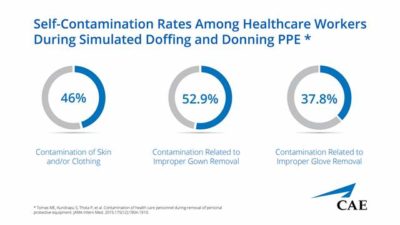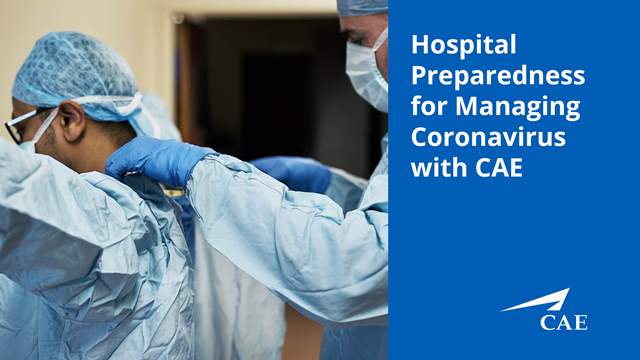When CAE Healthcare announced the availability of its COVID-19 simulation training scenario for healthcare providers this month, the response was immediate, and eye-opening.
“The novel coronavirus response is going to completely reshape the education system globally. It’s going to force us to reevaluate how we always did training,” says CAE Healthcare Chief Learning Offer Amar Patel.
With just a few days’ notice, nearly 1,000 nurses, physicians and clinical educators from 30 countries logged into CAE Healthcare’s one-hour webinars about COVID-19 preparedness. When asked in a survey if their hospital was prepared to manage the coronavirus, only 39 per cent of clinicians agreed. Simulation can help close the gap on preparation to manage the pandemic.
“The clinical workforce is being utilized in unique places, in areas they were not trained. A classic example may be an obstetrician working in the adult ICU,” Patel says. “How do we get them up to speed, refresh their memories and give them new foundational knowledge?”
CAE Healthcare, a division of global aviation training leader CAE, has been known for highly realistic medical simulators, and most recently, its augmented reality applications for Microsoft HoloLens 2. Today, the fastest growing segment of the company is its custom training services for hospitals. Over the past year, Patel has doubled the size of the CAE Healthcare Academy, a global team of clinical educators and adjunct faculty who have worked in the field and specialize in simulation-based training.
Within a few short weeks of the coronavirus outbreak, the CAE Healthcare Academy released a COVID-19 Simulated Clinical Experience (SCE) to train front-line nurses, emergency room physicians, respiratory therapists, and more. Patel, who developed similar training for hospitals during the Ebola outbreak, wanted to ensure that healthcare providers protected themselves before caring for patients.
 “The failure to properly don and doff Personal Protective Equipment (PPE) properly is one of the primary reasons why healthcare providers contract infectious diseases,” says Patel. “We’ve created a COVID-19 training scenario that includes the World Health Organization (WHO) PPE checklists, infection control practices, triage, containment and managing patient complications.”
“The failure to properly don and doff Personal Protective Equipment (PPE) properly is one of the primary reasons why healthcare providers contract infectious diseases,” says Patel. “We’ve created a COVID-19 training scenario that includes the World Health Organization (WHO) PPE checklists, infection control practices, triage, containment and managing patient complications.”
Already, many hospitals have cancelled clinical rotations for nursing students and even medical residents to preserve PPE for caregivers and safeguard students and patients. Nursing students have expressed fear that they will not complete their required clinical hours in time to graduate this year, and the pipeline of new medical professionals could be reduced when they are most needed.
“Educators are seeking ways to provide clinical education, what was previously considered hands-on training, within a virtual format,” says Patel. “With the shortage of PPE, for example, they are asking, ‘How do I teach donning and doffing to the actively engaged workforce and find a way for people to learn without the equipment?’ We are turning to video-based learning.”
For the duration of the pandemic, the CAE Healthcare Academy has summoned all of its forces in the field to provide just-in-time training to front-line clinicians before they begin to see patients. When the day arrives that systems can begin to look beyond the crisis, Patel envisions a transformed educational landscape for healthcare. “We will reevaluate how we conduct training in a digital realm and how we distribute education. It’s unprecedented, and it’s an opportunity for the medical community to learn and become better prepared.”
The CAE Healthcare Academy is delivering ongoing, one-hour training webinars for healthcare providers and a complimentary training scenario, titled Suspected COVID-19, all of which is available online at https://caehealthcare.com/covid19/. A four-scenario training course, Pathogens of High Consequence, will be offered to healthcare providers and systems in the coming weeks.


